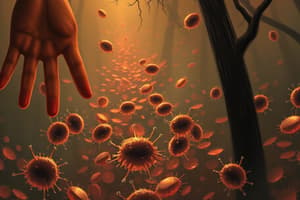Podcast
Questions and Answers
What are the primary stages in the life cycle of a bacteriophage?
What are the primary stages in the life cycle of a bacteriophage?
The primary stages are attachment, penetration, replication, assembly, and lysis.
In what medical situations can bacteriophages be utilized?
In what medical situations can bacteriophages be utilized?
Bacteriophages can be used to treat bacterial infections, especially those resistant to antibiotics.
How does phage therapy differ from traditional antibiotic treatment?
How does phage therapy differ from traditional antibiotic treatment?
Phage therapy specifically targets bacteria and can reduce harmful bacteria without disrupting beneficial microbiota, unlike broad-spectrum antibiotics.
What are some potential solutions to combat antimicrobial resistance?
What are some potential solutions to combat antimicrobial resistance?
What was the historical significance of phage use in medicine?
What was the historical significance of phage use in medicine?
What are the main steps in the life cycle of a bacteriophage after it attaches to a host cell?
What are the main steps in the life cycle of a bacteriophage after it attaches to a host cell?
How do bacteriophages serve as a potential alternative therapy for treating bacterial infections?
How do bacteriophages serve as a potential alternative therapy for treating bacterial infections?
In what way do phages differ from antibiotics in their action against bacteria?
In what way do phages differ from antibiotics in their action against bacteria?
What role do holin and lysin enzymes play in bacteriophage infection?
What role do holin and lysin enzymes play in bacteriophage infection?
What historical significance do bacteriophages have in the context of medical treatment?
What historical significance do bacteriophages have in the context of medical treatment?
Why is there a resurgence of interest in phage therapy in recent years?
Why is there a resurgence of interest in phage therapy in recent years?
What are the benefits of using phages as smart drugs in therapeutic applications?
What are the benefits of using phages as smart drugs in therapeutic applications?
What is one challenge faced by researchers in utilizing phage therapy in combatting bacterial infections?
What is one challenge faced by researchers in utilizing phage therapy in combatting bacterial infections?
What are the main life cycle stages of a bacteriophage?
What are the main life cycle stages of a bacteriophage?
What medical applications are bacteriophages used for?
What medical applications are bacteriophages used for?
How does phage therapy differ from traditional antibiotic treatment?
How does phage therapy differ from traditional antibiotic treatment?
What strategies are being explored to combat antimicrobial resistance?
What strategies are being explored to combat antimicrobial resistance?
Provide a brief history of phage use in medicine.
Provide a brief history of phage use in medicine.
What challenges exist in the application of bacteriophage therapy?
What challenges exist in the application of bacteriophage therapy?
Why is the immune response against bacteriophages a concern in treatment?
Why is the immune response against bacteriophages a concern in treatment?
What role do public health measures play in preventing antibiotic resistance?
What role do public health measures play in preventing antibiotic resistance?
Describe how phages are genetically engineered for medical use.
Describe how phages are genetically engineered for medical use.
What are the ethical considerations associated with bacteriophage therapy?
What are the ethical considerations associated with bacteriophage therapy?
What are bacteriophages and what role do they play in the medical field?
What are bacteriophages and what role do they play in the medical field?
How do bacteriophages selectively target bacterial cells without harming human cells?
How do bacteriophages selectively target bacterial cells without harming human cells?
What advantage does phage therapy have over traditional antibiotics?
What advantage does phage therapy have over traditional antibiotics?
What is the main challenge in using bacteriophages therapeutically?
What is the main challenge in using bacteriophages therapeutically?
Can you name a historical use of phages in medicine?
Can you name a historical use of phages in medicine?
What are some current medical applications of phage therapy?
What are some current medical applications of phage therapy?
Explain the mechanism through which interferon alpha aids in viral infection response.
Explain the mechanism through which interferon alpha aids in viral infection response.
What role do humanized antibodies play in immunotherapeutics?
What role do humanized antibodies play in immunotherapeutics?
How does the expression of protein kinase and 2'-5' oligoadenylate synthetase help combat viral infections?
How does the expression of protein kinase and 2'-5' oligoadenylate synthetase help combat viral infections?
In what way does interleukin-2 contribute to the immune response against viruses?
In what way does interleukin-2 contribute to the immune response against viruses?
What are the two distinct life cycles of bacteriophages?
What are the two distinct life cycles of bacteriophages?
How do bacteriophages potentially combat antibiotic-resistant bacteria?
How do bacteriophages potentially combat antibiotic-resistant bacteria?
In what way can the lytic life cycle of bacteriophages be weaponized?
In what way can the lytic life cycle of bacteriophages be weaponized?
What role does maintaining high concentrations of antimicrobial drugs play in limiting resistance?
What role does maintaining high concentrations of antimicrobial drugs play in limiting resistance?
What is the significance of combining antimicrobial agents in combating resistance?
What is the significance of combining antimicrobial agents in combating resistance?
What are some of the solutions proposed for limiting antimicrobial resistance?
What are some of the solutions proposed for limiting antimicrobial resistance?
What are bacteriocins and their relevance in antimicrobial therapy?
What are bacteriocins and their relevance in antimicrobial therapy?
What is the historical context of phage use in medicine?
What is the historical context of phage use in medicine?
Describe a key difference between phage therapy and traditional antibiotic therapy.
Describe a key difference between phage therapy and traditional antibiotic therapy.
What is the primary function of the immune system in conjunction with antimicrobial drugs?
What is the primary function of the immune system in conjunction with antimicrobial drugs?
Flashcards are hidden until you start studying
Study Notes
Bacteriophage Life Cycle
- Phages attach to host cells and inject their DNA, initiating infection.
- Nucleic acids and proteins are synthesized, leading to assembly of new phage particles.
- Phages can release approximately 300 particles within 22 minutes.
- Lysis of the host occurs via:
- Holin: enzyme that destabilizes the cell membrane by forming pores.
- Lysin: enzyme that breaks down the bacterial cell wall, leading to cell lysis.
Bacteriophage Therapeutics
- Bacteriophages provide alternative therapies against antibiotic-resistant bacterial infections.
- They are narrow-spectrum antimicrobials, preserving normal flora.
- Phages replicate independently, functioning as "smart drugs."
- Interest in phage therapy is increasing in agriculture and healthcare.
- Historic use of phages has been noted in Eastern Europe and Russia.
Clinical Considerations for Bacteriophage Use
- Clearance from the circulatory system is not an issue with topical applications.
- Immune responses against phages can increase with repeated treatments.
- Access to the sites of infection is critical for effective phage therapy.
Antimicrobial Drugs Overview
- Antiviral drugs disrupt viral replication and attachment.
- Antifungal drugs primarily cause membrane damage.
- Antiprotozoal agents aim to eliminate parasitic infections.
- Antihelminthic agents specifically target non-dividing helminths.
Immunotherapeutics
- These agents boost the immune response against pathogens or cancer.
- Key immunotherapeutic agents include:
- Interferon alpha: combats viral infections, especially Hepatitis C.
- Humanized antibodies: effective against various infectious agents.
- Interleukin-2 and -12: enhance antiviral activity.
- Antibody-toxin conjugates: utilized for antimicrobial and anti-cancer purposes.
Interferon Alpha
- Produced by multiple cell types and plays a vital role in the antiviral immune response.
- Recombinant forms are used to treat specific viral infections such as Hepatitis C.
- It also has activity against certain bacteria and protozoa beyond its antiviral properties.
Resistance to Antimicrobial Drugs
- Strategies to limit resistance include:
- Maintaining high drug concentrations to ensure efficacy over time.
- Combining antimicrobial agents for synergistic effects.
- Using specific antimicrobials judiciously.
- Developing new drug variations to overcome resistance.
- Searching for novel antibiotics, including bacteriocins and antimicrobial peptides.
Studying That Suits You
Use AI to generate personalized quizzes and flashcards to suit your learning preferences.




